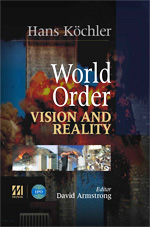Book cover

Table of contents

About this book
This
volume of collected papers
contains around three dozen articles and analyses written by Hans Köchler
since the end of the Cold War era.
In the main chapters – “World Order and the Rule of Law” and “Civilization
and World Order” – the book deals with basic issues of the global balance of
power, the consequences of globalization, questions of international
democracy and United Nations reform, the “global war on terror,”
international justice versus power politics, and the paradigm of the “clash
of civilizations.” The essays are arranged according to a thematic sequence
from general aspects of international relations theory to applied questions
of international politics. In the preface, the author explains what
motivated him to publish this volume of collected papers: “Periods of global
change are often seized as ‘moment of ideology’ by those who see themselves
as beneficiaries of the new constellation and are tempted to monopolize the
discourse on ‘justice,’ ‘democracy,’ ‘human rights’ for the sole purpose of
perpetuating a situation they perceive as advantageous in terms of the power
equation.” The essays in this book try to unravel that ideology and
to create an alternative vision of a just and democratic world order.
Book review:
Mainstream, New Delhi

